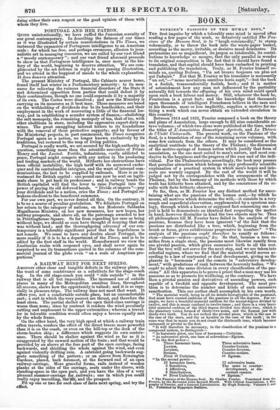PORTUGAL AND HER PATRON.
QUITE unintentionally, we have ruffled the Junonian serenity of our great contemporary. In describing the flatness of our times as it was illustrated by certain manifestations in The Times, we instanced the expansion of Portuguese intelligence to an American scale : for which too free, and perhaps erroneous, allusion to jour- nalistic art in managing resources, we are called by our vast friend a " moody contemporary "; and our vast friend aforesaid proceeds to show us that Portuguese intelligence is, once more in the his- tory of the world, beginning to deserve attention. We are com- plimented by the set defence in reply to our passing illustration, and we attend in the happiest of moods to the whole explanation. It does deserve attention.
The present Ministry of Portugal, like Cabinets nearer home, found itself last winter in a Parliamentary minority : to its mea- sures for relieving the ruinous financial disorders of the State it met determined opposition from parties that could defeat it by their combinations, though no one could supersede it by a majority of its own. The Cortes were dissolved ; and now the Ministry is carrying on its measures as it best'may. Those measures are based on the withholding of dividends due to its bondholders, and their employment in the work of recovering a little of the financial lee- way, and in establishing a sounder system of finance,—abolishing the salt monopoly, the remaining monopoly of tea, that of ice, with other abolitions in store, including the oppressive export-duty on wines. The great smuggling interest totters to its foundations with the removal of these protective supports; and by favour of the Ministerial projects, in part commenced, the Times recognizes Portugal again as a nation, no longer known exclusively by its traditions, but restored to the map of living politics. Portugal is really worth, we are assured by the high authority in question, something more than the scientific souvenirs of Prince Henry and the Lusiad. Fertile, industrious, really addicted to peace, Portugal might compete with any nation in the producing and trading markets of the world. Hitherto her obstructions have been official instability, the high tariff with its narrowed exche- quer and its contrabandist intrigues, and the want of internal com- munications, the last to be supplied by railroads. Here is an in- vestment for British capital : one pound can now be sent on legiti- mate chase to get back its predecessor • and in railway bonds the British capitalist will find the lever io raise Portugal into the power of paying its old deferred bonds. " Divide et iinpera "—pay your dividends and be a nation, cries the Times ; and Portugal re- wakens obedient to the beneficent summons.
For our own part, we never denied all this. On the contrary, it is to us a source of peculiar gratulation. We felicitate Portugal on her return to the category of nations, on her Moderate Saldanha Magalhaens Ministry, on her new measures, her new hopes, her railway prospects, and above all, on the patronage awarded to her in Printinghouse Square. So far from regarding her case as being without hope, we should as soon have thought of denying that she was without land ; and the thoroughgoing advocacy of our con- temporary is a tolerably significant proof that the hopefulness is not remote. We cease to have any doubts about Portugal, the more readily if it is to be a department of the Times, and is to be edited by the first staff in the world. Henceforward we view the Lusitanian realm with reopened eyes, and shall never again be surprised to see its transactions quoted in the columns of the com- mercial journal of the globe even " on a scale of Amfrican pro- portions.


























 Previous page
Previous page